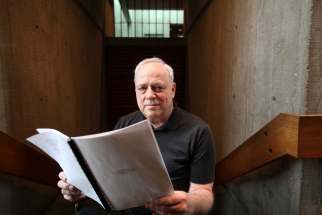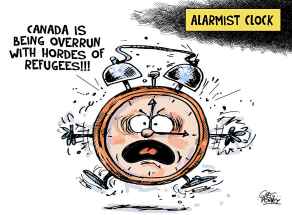Winnipeggers to decide fate of Portage and Main in fall election; lack of rules raises concerns
Read this article for free:
or
Already have an account? Log in here »
To continue reading, please subscribe:
Monthly Digital Subscription
$0 for the first 4 weeks*
- Enjoy unlimited reading on winnipegfreepress.com
- Read the E-Edition, our digital replica newspaper
- Access News Break, our award-winning app
- Play interactive puzzles
*No charge for 4 weeks then price increases to the regular rate of $19.00 plus GST every four weeks. Offer available to new and qualified returning subscribers only. Cancel any time.
Monthly Digital Subscription
$4.75/week*
- Enjoy unlimited reading on winnipegfreepress.com
- Read the E-Edition, our digital replica newspaper
- Access News Break, our award-winning app
- Play interactive puzzles
*Billed as $19 plus GST every four weeks. Cancel any time.
To continue reading, please subscribe:
Add Free Press access to your Brandon Sun subscription for only an additional
$1 for the first 4 weeks*
*Your next subscription payment will increase by $1.00 and you will be charged $16.99 plus GST for four weeks. After four weeks, your payment will increase to $23.99 plus GST every four weeks.
Read unlimited articles for free today:
or
Already have an account? Log in here »
Hey there, time traveller!
This article was published 19/07/2018 (2705 days ago), so information in it may no longer be current.
Concerns are being raised about the lack of rules and regulations surrounding the Oct. 24 ballot question that will ask Winnipeggers whether Portage and Main should be reopened to pedestrians.
Manitoba is one of only three provinces that has no regulations surrounding election-ballot questions, which means supporters and opponents could spend as much as they want in a campaign that could continue outside voting locations up to the time the polls close.
Debate rages on
Do you support the opening of Portage and Main to pedestrian crossings? YES/NO
Do you support the opening of Portage and Main to pedestrian crossings? YES/NO
•••
Winnipeg voters will soon get a chance to do something they haven’t done in 35 years – vote on a question placed on the fall election ballot.
In an overwhelming 14-1 vote, council supported putting a simple yes-or-no question on the Oct. 24 ballot, on whether Portage and Main should be re-opened to pedestrians.
The only vote against was from Coun. Jenny Gerbasi, who is not running for re-election.
Coun. Russ Wyatt, who is facing criminal sexual assault charges, was absent from the meeting.
Debate on the issue prompted all but two councillors — Shawn Dobson and Mike Pagtakhan — to stand and speak.
The outcome on the ballot question will be non-binding on council but Mayor Brian Bowman said he would consider the vote binding and previously had challenged other mayoral candidates to say the same.
Mayoral candidate Jenny Motkaluk, who opposes re-opening the intersection, later told the Free Press she would abide by the outcome of the ballot vote.
“If I’m elected and the voters ask me to open Portage and Main, through that plebiscite, to pedestrian traffic, then that’s what we’re going to do,” she said.

Mayoral candidate Jenny Motkaluk
“With the potential for a free-for-all on the subject, I question whether voters will have quality information on which to base their decision,” said University of Winnipeg political studies professor Aaron Moore.
Council voted 14-1 Thursday to put the question to residents.
There are strict election campaign rules for candidates, including a requirement to disclose contributors’ identities and donations, limits on the amount of individual contributions and election-day campaigning.
But none of the rules apply to ballot questions.
A civic spokesman said council could pass a bylaw establishing rules on third-party advertising on a ballot question but it’s uncertain if it would be binding. In addition, Thursday’s meeting was the last until September, as members of council traditionally go into a summer recess.
Conceivably, Mayor Brian Bowman could try to set up an emergency council meeting to pass such a bylaw before September or the administration could bring a bylaw for council’s consideration then, but that would be too late.

“There certainly seems to be nothing that will prevent third parties from running ads on the issues, which is problematic,” Moore said.
Winnipeggers were asked about global nuclear disarmament and Manitoba’s controversial English only-language laws in 1983. And in 1968, voters were asked if they would support commercial billiard halls operating on Sundays.
Mayoral candidate Jenny Motkaluk, who opposed holding a plebiscite, said she’s concerned that the Portage and Main question could dominate the campaign at the expense of other issues.
Several councillors raised concerns about the merits of ballot questions in the first place, but it was Coun. Scott Gillingham who captured the issue most clearly.
Previous ballot questions.

The last time the City of Winnipeg held a plebiscite was 1983. Here are the two questions voters were asked.
The last time the City of Winnipeg held a plebiscite was 1983. Here are the two questions voters were asked:
“Should the provincial government withdraw its proposed constitutional amendment and allow the Bilodeau case to proceed to be heard and decided by the Supreme Court of Canada on the validity of English-only laws passed by the legislature of Manitoba since 1890?”
The result: 76.49% of Winnipeggers voted “yes.”
“Do you support nuclear disarmament by all nations on a gradual basis with the ultimate goal of a world free of nuclear weapons and mandate the federal government to negotiate and implement with other governments steps leading to the earliest possible accomplishment of this goal?”
The result: 76.91% of voters supported disarmament.
Before 1983, the last city referendum was held in 1968, when voters agreed to allow commercial billiard halls to remain open on Sundays.
Gillingham (St. James-Brooklands-Weston) said he didn’t know if the use of a ballot question is a demonstration of direct democracy or an abdication of council responsibility, but he said city hall has never considered the implications.
“This city does not have any thought-out standards, criteria or policy for when a plebiscite should be triggered, what types of matters should or can appear as a plebiscite on this or any future ballot,” Gillingham said. “We do not have rules around advertising, promotion, the messaging, including spending limits for the respective positions on both sides.”
Gillingham also wondered aloud about the question; who gets to write it and who ensures it’s a fair question designed to get an accurate response from voters? And, he wanted to know what level of support is enough to compel council to follow the outcome of the vote.
“The next council needs to have a larger debate before the use of any other plebiscite or referendum in the future, a debate that will establish the necessary policy needed surrounding the use of these democratic tools.”
aldo.santin@freepress.mb.ca
History
Updated on Thursday, July 19, 2018 7:05 PM CDT: Adds second sidebar.












